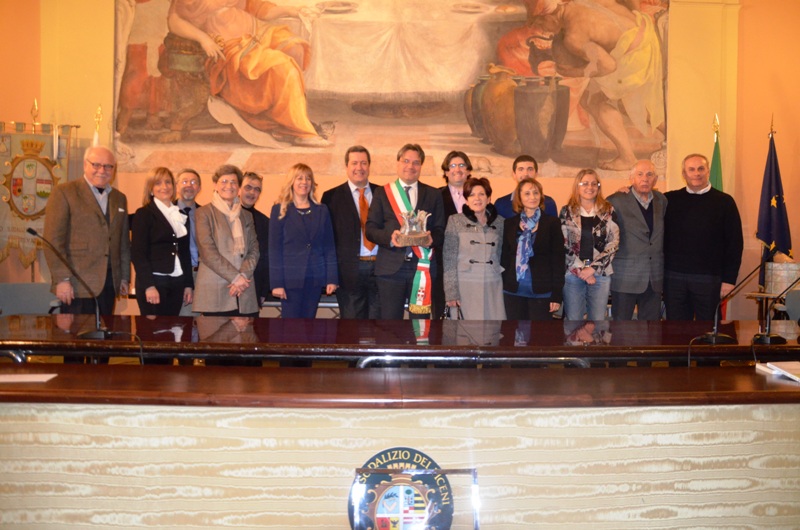
Jan 30, 2016 | Focolare Worldwide
 Asti, the Piedmont (Italy) municipality renowned worldwide for its wines and an old pre-Roman settlement, boasts another first: that of being the first Italian municipality to have inserted the principle of Fraternity in its Municipal Statutes, as one of the main inspiring principles. «The Municipality of Asti considers the value of Fraternity as the condition for its political actions, in the common awareness that diversity is enrichment and to which every person elected in this institution is subjected to, and who should thus be recognised with equal dignity and respect and is therefore called to place the good of the community before partial interests, whether personal, of the group or the political party.» This is the text that passed with a unanimous vote on 19 February 2015, and won for the Municipality, the prize awarded in Rome by Mayor Fabrizio Brignolo last 22 January. How is this inspiring principle concretely practiced by the citizens? At the awarding of the prize, the Mayor of Asti recalled how the Asti community is very active in projects that express the value of fraternity in a concrete way: in the issue of welcoming the refugees with individual projects, a system of social services that targets to involve the beneficiaries in projects of recovery of independence in the employment and social fields, to name a few. So is the Municipality’s political life very simple? Not at all. A municipal councillor said: «The truth is, despite the fact that our ideals and political and cultural differences will not be eliminated, it also holds that moments of tension and conflicts will not be missing in our political –administrative debate. But it is likewise true that, from today onwards, we have a reference point and an extra precious tool that pushes us to seek the grounds for sharing, and in which we can exercise a serene approach to the building of fraternity. It is certainly a difficult challenge which we intend to win with courage and confidence. » The prize of the association, Cities for Fraternity, was awarded last 22 January by the president, Milvia Monachesi, Mayor of Castelgandolfo, together with Alba Sgariglia and João Manuel Motta of the Chiara Lubich Centre of the Focolare Movement, during the convention entitled, “Can Fraternity become a norm?” emceed by the journalist, Gianni Bianco, in the capital’s Hall, Pio Sodalizio dei Piceni (watch the live shoot ). Of great significance were the speeches of Prof. Filippo Pizzolato (Bicocca University, Milan) and Tiziano Vecchiato (Scientific Director of the Zancan Foundation, Padova), and the round table of the experiences and conflicts of the Municipalities that have inserted the principle of fraternity in their statutes: Asti, Bra, Grottaferrata and Rocca di Papa. Other honours were conferred to three other Municipalities: • Special Honours for the City of Rocca di Papa, which had launched the project of United Cities for Fraternity: «From darkness to light: “Wednesdays in the village”» with the mission to “enlighten the outstanding features and reunite hearts and minds” of the inhabitants – both Italians and of other nationalities – of Rocca di Papa. • Special Honours for the Municipality of Tolentino for the project, “Tolentino – city for fraternity” and the organisation of the “Fraternity Dinner,” a traditional event with the cooperation of the voluntary associations and citizens, where the funds collected were assigned to the poor people in the municipality. • Special Honours for the Municipality of Grottaferrata for the insertion of the value of Fraternity in the Municipal Statutes, as the condition for political action, unanimously approved by the Municipal Council on 27 April 2015. https://www.youtube.com/watch?v=cEtFoAdo6IE https://www.youtube.com/watch?v=P9bfpKF30Wk
Asti, the Piedmont (Italy) municipality renowned worldwide for its wines and an old pre-Roman settlement, boasts another first: that of being the first Italian municipality to have inserted the principle of Fraternity in its Municipal Statutes, as one of the main inspiring principles. «The Municipality of Asti considers the value of Fraternity as the condition for its political actions, in the common awareness that diversity is enrichment and to which every person elected in this institution is subjected to, and who should thus be recognised with equal dignity and respect and is therefore called to place the good of the community before partial interests, whether personal, of the group or the political party.» This is the text that passed with a unanimous vote on 19 February 2015, and won for the Municipality, the prize awarded in Rome by Mayor Fabrizio Brignolo last 22 January. How is this inspiring principle concretely practiced by the citizens? At the awarding of the prize, the Mayor of Asti recalled how the Asti community is very active in projects that express the value of fraternity in a concrete way: in the issue of welcoming the refugees with individual projects, a system of social services that targets to involve the beneficiaries in projects of recovery of independence in the employment and social fields, to name a few. So is the Municipality’s political life very simple? Not at all. A municipal councillor said: «The truth is, despite the fact that our ideals and political and cultural differences will not be eliminated, it also holds that moments of tension and conflicts will not be missing in our political –administrative debate. But it is likewise true that, from today onwards, we have a reference point and an extra precious tool that pushes us to seek the grounds for sharing, and in which we can exercise a serene approach to the building of fraternity. It is certainly a difficult challenge which we intend to win with courage and confidence. » The prize of the association, Cities for Fraternity, was awarded last 22 January by the president, Milvia Monachesi, Mayor of Castelgandolfo, together with Alba Sgariglia and João Manuel Motta of the Chiara Lubich Centre of the Focolare Movement, during the convention entitled, “Can Fraternity become a norm?” emceed by the journalist, Gianni Bianco, in the capital’s Hall, Pio Sodalizio dei Piceni (watch the live shoot ). Of great significance were the speeches of Prof. Filippo Pizzolato (Bicocca University, Milan) and Tiziano Vecchiato (Scientific Director of the Zancan Foundation, Padova), and the round table of the experiences and conflicts of the Municipalities that have inserted the principle of fraternity in their statutes: Asti, Bra, Grottaferrata and Rocca di Papa. Other honours were conferred to three other Municipalities: • Special Honours for the City of Rocca di Papa, which had launched the project of United Cities for Fraternity: «From darkness to light: “Wednesdays in the village”» with the mission to “enlighten the outstanding features and reunite hearts and minds” of the inhabitants – both Italians and of other nationalities – of Rocca di Papa. • Special Honours for the Municipality of Tolentino for the project, “Tolentino – city for fraternity” and the organisation of the “Fraternity Dinner,” a traditional event with the cooperation of the voluntary associations and citizens, where the funds collected were assigned to the poor people in the municipality. • Special Honours for the Municipality of Grottaferrata for the insertion of the value of Fraternity in the Municipal Statutes, as the condition for political action, unanimously approved by the Municipal Council on 27 April 2015. https://www.youtube.com/watch?v=cEtFoAdo6IE https://www.youtube.com/watch?v=P9bfpKF30Wk
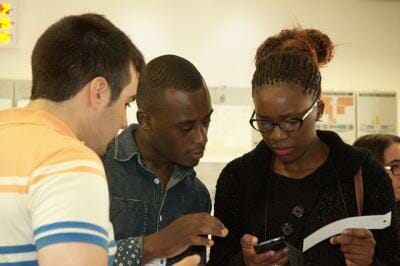
Jan 29, 2016 | Non categorizzato
 «I’m African and studying in Northern Italy. Some time ago I read an article in a magazine, in which the author said that a “dark night” is pervading every aspect of western culture, leading to a loss of the authentic Christian values. Sincerely, I did not understand what this meant, until something happened to open my eyes. It was a Saturday afternoon. Some kids, neighbours of mine, invited me to go out with them and spend an evening together. They wanted to do something different. There were six or seven of us and we started the evening dancing in a local disco. Initially I enjoyed it and they said music ran in my blood, and I danced well. But soon I noticed that the people around me were dancing without any respect for themselves or for the others. They were not dancing for pure enjoyment but were launching ambiguous messages. A small voice inside me told me to go against the current and dance with dignity and out of love. After a few hours, my friends suggested we go to another club. I trusted them since they were my friends, and so I accepted. In this other club it did not take long for me to realize where we had landed. The music was very loud, psychedelic lights pulsed to the rhythm, an acrid smell started to diffuse, and I was astonished. This was not a normal disco, and the girls prostituted themselves. I was disappointed and angry. Without saying a word, I turned on my heel and left. One of my friends came after me. He insulted me, saying I was slow in the head. I did not answer. After a few minutes, another one came, but this time he did not insult me, but said I was right. Lastly, another sneaked out of the club and also he said I was right. I was surprised. I had created a countercurrent chain. Without even speaking of the Christian ideals I believe in, or of God, the others had seen and understood. A few months passed and I had completely forgotten that episode. One day, a boy, who had been with us that evening, came to me saying he regretted it and would never again frequent that type of club. I was astonished. Evidently, Jesus was working on him. This experience has helped me to see in a more radical way, the need to risk and say “no” to certain proposals of the world, because it is our testimony that strikes people, even though we are unaware of it.» (Yves, Cameroon) From “Una buona notizia, gente che crede gente che muove”, Chiara Favotti, Ed. New City 2012
«I’m African and studying in Northern Italy. Some time ago I read an article in a magazine, in which the author said that a “dark night” is pervading every aspect of western culture, leading to a loss of the authentic Christian values. Sincerely, I did not understand what this meant, until something happened to open my eyes. It was a Saturday afternoon. Some kids, neighbours of mine, invited me to go out with them and spend an evening together. They wanted to do something different. There were six or seven of us and we started the evening dancing in a local disco. Initially I enjoyed it and they said music ran in my blood, and I danced well. But soon I noticed that the people around me were dancing without any respect for themselves or for the others. They were not dancing for pure enjoyment but were launching ambiguous messages. A small voice inside me told me to go against the current and dance with dignity and out of love. After a few hours, my friends suggested we go to another club. I trusted them since they were my friends, and so I accepted. In this other club it did not take long for me to realize where we had landed. The music was very loud, psychedelic lights pulsed to the rhythm, an acrid smell started to diffuse, and I was astonished. This was not a normal disco, and the girls prostituted themselves. I was disappointed and angry. Without saying a word, I turned on my heel and left. One of my friends came after me. He insulted me, saying I was slow in the head. I did not answer. After a few minutes, another one came, but this time he did not insult me, but said I was right. Lastly, another sneaked out of the club and also he said I was right. I was surprised. I had created a countercurrent chain. Without even speaking of the Christian ideals I believe in, or of God, the others had seen and understood. A few months passed and I had completely forgotten that episode. One day, a boy, who had been with us that evening, came to me saying he regretted it and would never again frequent that type of club. I was astonished. Evidently, Jesus was working on him. This experience has helped me to see in a more radical way, the need to risk and say “no” to certain proposals of the world, because it is our testimony that strikes people, even though we are unaware of it.» (Yves, Cameroon) From “Una buona notizia, gente che crede gente che muove”, Chiara Favotti, Ed. New City 2012
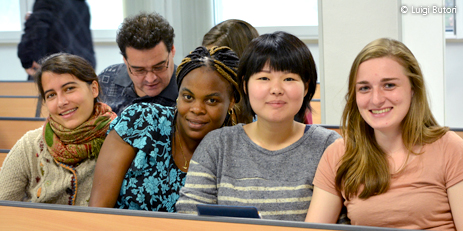
Jan 28, 2016 | Non categorizzato
 Sophia University Institute and the insertion of its graduates in the employment world: a more or less difficult relationship with respect to other academic programs? Eight years after the inauguration of the Sophia University Institute (SUI), the Italian professor of Social Research Methodology, performed a survey starting from these interrogatives. Some observations taken from the survey. The survey sample consisted in the first 80 SUI graduates, those who attended and concluded a two-year course with the achievement of a degree within the year 2014. In the first two months of 2015 this group was asked to respond to a semi-structured questionnaire, drafted to get some essential information on the professional pathways and lifestyles undertaken after their studies in Sophia. Out of a total of young graduates 61 gave their response (75% out of the total) coming from 30 different countries; their collaboration enabled to focus on the value their studies in Sophia played in their quest for a job. Above all the study programme concluded in the foreseen period of two years in 91% of the sample; 81% found a job within six months, and 96% within a year. Today 51% of the degree holders have a stable job, 26% have a temporary job; 62% of the cases have a full-time job, and 26% work part time, while for 13% have a second job. Most of the graduates (63%) are assigned roles of responsibility in companies, public administrations, universities and in other cultural, non-profit agencies: 28% are freelance professionals, entrepreneurs, consultants; 7% are top directors and managers, and 28% work in the field of scientific-cultural education and research. Effectiveness of the educational program, compared to the actual job placement seems to have been confirmed: more than two-thirds of the graduates (68%) think that the SUI programme offered is aligned with the job they now hold. This effectiveness is set in relation to some specific transverse skills the graduates retain to have achieved or strengthened during their studies in Sophia. They mention in particular the capacity to interact in a “plural” context under the cultural and disciplinary profile , and problem-solving skills through the integration of different perspectives and competences, and managing situation of conflict, working in synergy in with other social and cultural players, promoting innovative solutions. To note, lastly, that none of the graduates regretted having undertaken the chosen pathway: 72% would willing redo the course as is, while 28% would redo it and suggest some changes. Among these, they highlighted the lack of apprenticeship and internship available in the two-year programme, a priority targeted by the Institute’s competent Offices. “The analysis of the strong points is very interesting,” Licia Paglione commented, “above all studying at Sophia meant getting involved in a programme of discovery and maturation of one’s own relational identity, a pathway that includes and upholds intellectual resources and at the same time imbues the psychological, affective, spiritual and operational dimensions and urges each toward commitment.”
Sophia University Institute and the insertion of its graduates in the employment world: a more or less difficult relationship with respect to other academic programs? Eight years after the inauguration of the Sophia University Institute (SUI), the Italian professor of Social Research Methodology, performed a survey starting from these interrogatives. Some observations taken from the survey. The survey sample consisted in the first 80 SUI graduates, those who attended and concluded a two-year course with the achievement of a degree within the year 2014. In the first two months of 2015 this group was asked to respond to a semi-structured questionnaire, drafted to get some essential information on the professional pathways and lifestyles undertaken after their studies in Sophia. Out of a total of young graduates 61 gave their response (75% out of the total) coming from 30 different countries; their collaboration enabled to focus on the value their studies in Sophia played in their quest for a job. Above all the study programme concluded in the foreseen period of two years in 91% of the sample; 81% found a job within six months, and 96% within a year. Today 51% of the degree holders have a stable job, 26% have a temporary job; 62% of the cases have a full-time job, and 26% work part time, while for 13% have a second job. Most of the graduates (63%) are assigned roles of responsibility in companies, public administrations, universities and in other cultural, non-profit agencies: 28% are freelance professionals, entrepreneurs, consultants; 7% are top directors and managers, and 28% work in the field of scientific-cultural education and research. Effectiveness of the educational program, compared to the actual job placement seems to have been confirmed: more than two-thirds of the graduates (68%) think that the SUI programme offered is aligned with the job they now hold. This effectiveness is set in relation to some specific transverse skills the graduates retain to have achieved or strengthened during their studies in Sophia. They mention in particular the capacity to interact in a “plural” context under the cultural and disciplinary profile , and problem-solving skills through the integration of different perspectives and competences, and managing situation of conflict, working in synergy in with other social and cultural players, promoting innovative solutions. To note, lastly, that none of the graduates regretted having undertaken the chosen pathway: 72% would willing redo the course as is, while 28% would redo it and suggest some changes. Among these, they highlighted the lack of apprenticeship and internship available in the two-year programme, a priority targeted by the Institute’s competent Offices. “The analysis of the strong points is very interesting,” Licia Paglione commented, “above all studying at Sophia meant getting involved in a programme of discovery and maturation of one’s own relational identity, a pathway that includes and upholds intellectual resources and at the same time imbues the psychological, affective, spiritual and operational dimensions and urges each toward commitment.”
Jan 27, 2016 | Non categorizzato, Word of
[soundcloud url=”https://soundcloud.com/user-958772872/word-of-life-february-2016″ params=”color=ff5500&auto_play=false&hide_related&visual=false&show_comments=true&show_user=true&show_reposts=false” width=”100%” height=”166″ iframe=”true” /]
This Word of Life is an invitation to believe in God’s loving action even where his presence is not felt. It is a proclamation of hope and challenge that we too might we become instruments of consolation. Who hasn’t seen a crying child throw itself into its mother’s arms? Whatever the matter is, important or not, the mother dries its tears, covers it with tenderness and, bit by bit, it starts to smile again. Her presence and loving kindness are enough. God behaves like this with us, and compares himself to a mother. These words are how God speaks to his people on their return from exile in Babylon. They had seen their homes and the Temple demolished and had been deported to a foreign land where they felt lost and grief-stricken; now, returning to their homeland, the people had to rebuild from the rubble of destruction. The tragedy Israel had lived through is repeated by many war-torn peoples, victims of terrorist atrocities or inhuman exploitation. Houses and streets ripped apart, sites symbolic of a cultural identity razed to the ground, goods pillaged, places of worship destroyed. How many people kidnapped, millions forced to flee, thousands dying in deserts or at sea! It looks like an apocalypse. This Word of Life is an invitation to believe in God’s loving action also where his presence is not felt. It is a proclamation of hope. He is beside the one who suffers persecution, injustice, exile.
He is with us, with our family, with our people. He knows our personal pain and that of the whole human race. He became one of us, to the point of dying on a cross. This is why he knows how to understand us and comfort us. Just like a mother who takes her child onto her lap and comforts it. We need to open our eyes and hearts to ‘see him’. To the extent that we experience the tenderness of his love, we will be able to transmit it to those who live in pain and under trial, so that we become instruments of consolation. Paul, too, suggests it to the Corinthians: ‘console those who are in any affliction with the consolation with which we ourselves are consoled by God’ (2 Cor. 1:4).
This was also a deeply personal and specific experience of Chiara Lubich: ‘Lord, give me all who are lonely … I have felt in my heart the passion that fills your heart for all of the forsakenness in which the whole of the world is drifting. I love everyone who is sick and alone. Who consoles their weeping? Who mourns their slow death? Who presses to their own heart, the heart in despair? My God, let me be in this world the tangible sacrament of your love; let me be your arms that press to themselves and consume in love all the loneliness of the world.’ 1
Edited by Fabio Ciardi
This Word of Life was chosen by an ecumenical group in Germany. We are living it together with brothers and sisters from many different Churches. Our hope is that our lives throughout the year may be accompanied by the promise from God that it contains. 1 Chiara Lubich, Meditations (London : New City, 2005), 24
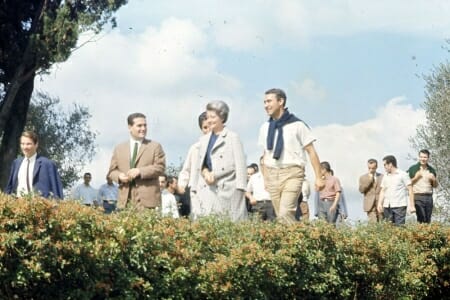
Jan 27, 2016 | Non categorizzato
Following the request put by the Focolare Movement on 7th December 2013 to the Rt Rev. Raffaello Martinelli, Bishop of Frascati, on 27th January last year Chiara Lubich’s cause of Beatification was opened. “Our only wish is to offer the Church and humankind the gift that Chiara was for us and for a vast number of people” said Maria Voce, President of the Focolare Movement on that occasion. “Receiving the charism God gave her … Chiara worked so that this pathway of Gospel life could be followed by many people. She always renewed her determination to help all those she met to put God in the first place in their lives and to “become saints together”. Her vision and her heart were motivated by a universal love which was able to embrace all people, going beyond all differences, and always directed towards fulfilling the testament of Jesus: “May they all be one”.
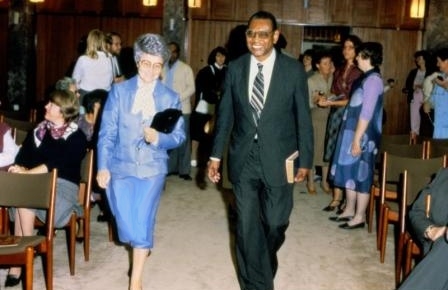
1982: Chiara Lubich with Philip Potter at the World Council of Churches (WCC)
 We too have a path. … For us it is God’s will to walk along a collective pathway to holiness. To do so we need to keep in mind two aspects of our spirituality which we cannot do without. We cannot become saints if the Risen Lord is not living in us and among us. We are in the midst of the world and whichever way we turn we find something that is in contradiction to Christ and his way of thinking. In the world there is an atmosphere of consumerism, hedonism, materialism and secularism everywhere. How can we bring the presence of God effectively and constantly into today’s society more and more? How can we avoid the world’s snares? How can we stick to the decisions we make in moments of grace? Our Lady has given us a great way of doing this in her Work. She has built up everywhere, in different ways, smaller or larger communities whose vocation it is to keep Jesus present in their midst. This means, therefore, not only overcoming personal problems by embracing Jesus Forsaken so that the Risen Lord can live in us, but it also means building unity with our brothers and sisters so that the Risen Lord can be in our midst. She knows that on our own, in a world like ours, it would be difficult to manage. For that reason she “invented” this spirituality which is called collective, precisely because it is lived by many people together …».
We too have a path. … For us it is God’s will to walk along a collective pathway to holiness. To do so we need to keep in mind two aspects of our spirituality which we cannot do without. We cannot become saints if the Risen Lord is not living in us and among us. We are in the midst of the world and whichever way we turn we find something that is in contradiction to Christ and his way of thinking. In the world there is an atmosphere of consumerism, hedonism, materialism and secularism everywhere. How can we bring the presence of God effectively and constantly into today’s society more and more? How can we avoid the world’s snares? How can we stick to the decisions we make in moments of grace? Our Lady has given us a great way of doing this in her Work. She has built up everywhere, in different ways, smaller or larger communities whose vocation it is to keep Jesus present in their midst. This means, therefore, not only overcoming personal problems by embracing Jesus Forsaken so that the Risen Lord can live in us, but it also means building unity with our brothers and sisters so that the Risen Lord can be in our midst. She knows that on our own, in a world like ours, it would be difficult to manage. For that reason she “invented” this spirituality which is called collective, precisely because it is lived by many people together …».
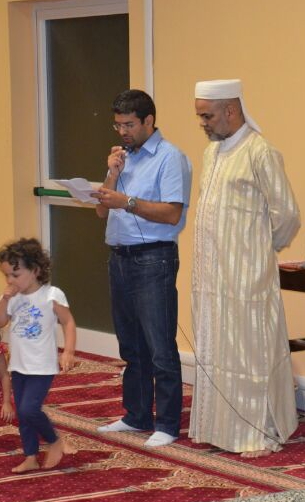
Jan 27, 2016 | Focolare Worldwide
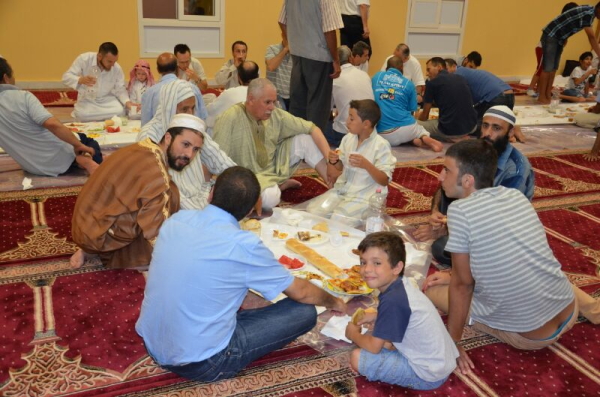 It all began in 2002, when the local community of the Focolare Movement met Mustapha Baztami, the Imam of the Muslim community of Teramo, truly a man of God who was so struck by the spirituality of unity that he has become its tireless promoter. Since then there have been many moments when both communities came together to share insights and reflections, such as how the Qur’an and the Bible view the family; they also gathered to share foods and flavours and seeing colours and fragrances blend into one, like the people who savoured them. But the real challenge has been to make a joint experience of friendship and solidarity as Muslims and Christians . One day Mustapha’s wife had a serious accident. The prolonged hospitalisation, also in other cities of Italy, gave the Focolare community the opportunity to stand at their side as brothers and sisters. It was like a contest of love between those who gave and those who received, and that became fertile ground for other initiatives, such as the creation of a literary competition called “Different but one”. For the past fifteen years they have made the weekly commitment to work side by side throughout the whole year. “Being children of God is what unites us. This is what gives you the freedom to share your story at the microphone, or to simply smile at a joke, or letting a few tears fall without feeling embarrassed,” states Donato of the Focolare. “You look at me without prejudices,” affirms a Muslim woman.
It all began in 2002, when the local community of the Focolare Movement met Mustapha Baztami, the Imam of the Muslim community of Teramo, truly a man of God who was so struck by the spirituality of unity that he has become its tireless promoter. Since then there have been many moments when both communities came together to share insights and reflections, such as how the Qur’an and the Bible view the family; they also gathered to share foods and flavours and seeing colours and fragrances blend into one, like the people who savoured them. But the real challenge has been to make a joint experience of friendship and solidarity as Muslims and Christians . One day Mustapha’s wife had a serious accident. The prolonged hospitalisation, also in other cities of Italy, gave the Focolare community the opportunity to stand at their side as brothers and sisters. It was like a contest of love between those who gave and those who received, and that became fertile ground for other initiatives, such as the creation of a literary competition called “Different but one”. For the past fifteen years they have made the weekly commitment to work side by side throughout the whole year. “Being children of God is what unites us. This is what gives you the freedom to share your story at the microphone, or to simply smile at a joke, or letting a few tears fall without feeling embarrassed,” states Donato of the Focolare. “You look at me without prejudices,” affirms a Muslim woman.  The effects of this dialogue haven’t gone unnoticed in the region. A Catholic association invited Mustapha and Donato to speak at an Islamic-Christian seminar. Things were going well, but the views of some participants regarding women in Islam created tensions in the hall. Mustapha and Donato interceded by saying that their friendship was based on a mutual desire to love which rises above culture and religion, seeking what unites rather than what might divide. “My life has changed dramatically,” says Mustapha, “since I met Chiara Lubich, a white and western Christian woman. She taught me to love everyone and to be the first to love.” From that moment on, the seminar took a different turn. One of the organizers went up to embrace him, saying, “Brother, I have realized that human reasoning is nothing compared to love.” Summer came and with it the desire to go on a family trip to the mountains together with the two communities. Upon arrival, the Muslim men unloaded flour, meat, vegetables, spices, pots and pans, while the women took their place in the kitchen in the nearby refectory. The Christians were no different: they took out homemade bread, stuffed olives and chicken dishes. As on any outing spent with friends, there were children’s games, chats, couscous, tea, long walks. Though totally unplanned, each moment was precious in consolidating a friendship that had gradually grown deeper. The next day, Mustapha sent a message saying, “… Let us ask God, the Most High, to continue illuminating our common pathways.” When the local bishop was asked to report to the prefecture on the relationship of his Catholic diocese with the Islamic community, he made reference to this experience of true dialogue.
The effects of this dialogue haven’t gone unnoticed in the region. A Catholic association invited Mustapha and Donato to speak at an Islamic-Christian seminar. Things were going well, but the views of some participants regarding women in Islam created tensions in the hall. Mustapha and Donato interceded by saying that their friendship was based on a mutual desire to love which rises above culture and religion, seeking what unites rather than what might divide. “My life has changed dramatically,” says Mustapha, “since I met Chiara Lubich, a white and western Christian woman. She taught me to love everyone and to be the first to love.” From that moment on, the seminar took a different turn. One of the organizers went up to embrace him, saying, “Brother, I have realized that human reasoning is nothing compared to love.” Summer came and with it the desire to go on a family trip to the mountains together with the two communities. Upon arrival, the Muslim men unloaded flour, meat, vegetables, spices, pots and pans, while the women took their place in the kitchen in the nearby refectory. The Christians were no different: they took out homemade bread, stuffed olives and chicken dishes. As on any outing spent with friends, there were children’s games, chats, couscous, tea, long walks. Though totally unplanned, each moment was precious in consolidating a friendship that had gradually grown deeper. The next day, Mustapha sent a message saying, “… Let us ask God, the Most High, to continue illuminating our common pathways.” When the local bishop was asked to report to the prefecture on the relationship of his Catholic diocese with the Islamic community, he made reference to this experience of true dialogue.
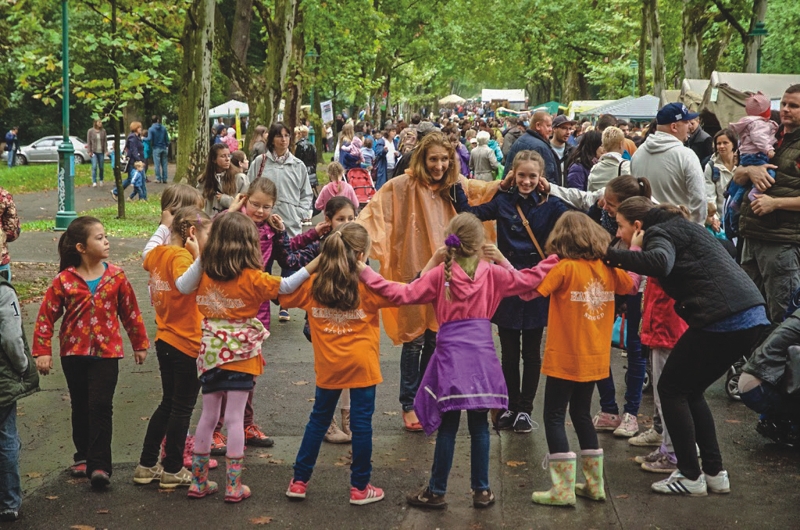
Jan 26, 2016 | Focolare Worldwide
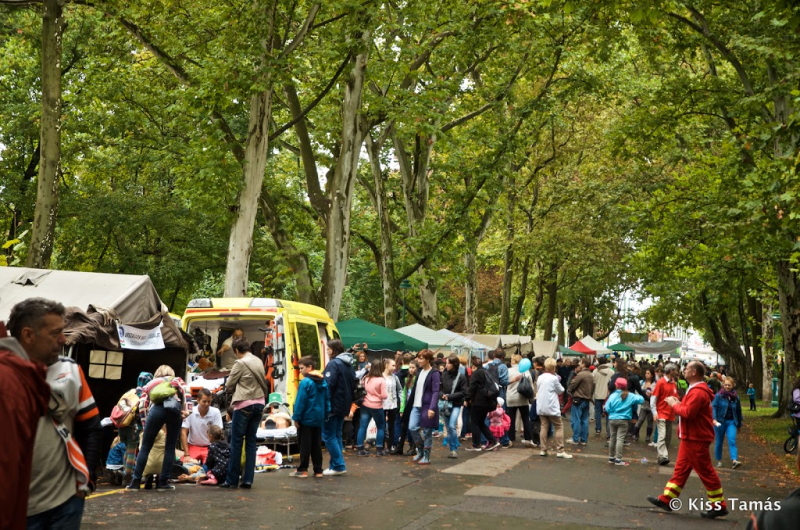 The festival took place in the park of Szeged, city in the south of Hungary and was “the biggest open-air, free of charge event of the year .” It was publicized at the Open Air Festival, in a press release, and distinguished itself for the great number of participants and performances. But what was the novelty of this event? «When, a few years ago they announced for the first time a possible Christian manifestation at city-level, no one thought that such an ambitious project could ever come about in our country, », wrote Új Város, the Focolare Magazine in Hungary. «It was not just the dream of a single person, but of the ecumenical group of pastors of that city. A dream which, a year and a half ago, started to take form, involving various religious, civil and political associations, » until it gave rise to the Festival held from 25 to 27 September. As Orsolya Szlaukó, an evangelical lady-pastor affirmed: «In Szeged, the ecumenical group of pastors that lance the idea of organising something that would announce Christianity. The logo and four colours and also the entire Festival drew inspiration from a Psalm: “the Lord led me out ” (Psalm, 18). We dreamt and thought of making a gift to the inhabitants of Szeged, by showing the unity of the Christian churches and the values of these communities. ». An organizer affirmed; «Our mission addresses the city and not only our communities», and another organizer, Sándor Tari added: «Our role was to ensure the good flow of the event, and not that of being in the limelight.» Another organizer added: «During the Festival each of us found the program which suited him best, from the youth to the elderly, » and the lady-pastor concluded: «We made room for concerts, round tables, playgrounds and stands of various organizations. ». «The 60 stands disseminated like huts along the park’s avenues, formed four city districts that showed the visitors the initiatives under way: an electrician held a workshop for kids, a healthcare stand which was visited by 700 people, with blood donation, and there were university professors who gave lessons. The parishes and the ecclesial communities held a great variety of creative initiatives.»
The festival took place in the park of Szeged, city in the south of Hungary and was “the biggest open-air, free of charge event of the year .” It was publicized at the Open Air Festival, in a press release, and distinguished itself for the great number of participants and performances. But what was the novelty of this event? «When, a few years ago they announced for the first time a possible Christian manifestation at city-level, no one thought that such an ambitious project could ever come about in our country, », wrote Új Város, the Focolare Magazine in Hungary. «It was not just the dream of a single person, but of the ecumenical group of pastors of that city. A dream which, a year and a half ago, started to take form, involving various religious, civil and political associations, » until it gave rise to the Festival held from 25 to 27 September. As Orsolya Szlaukó, an evangelical lady-pastor affirmed: «In Szeged, the ecumenical group of pastors that lance the idea of organising something that would announce Christianity. The logo and four colours and also the entire Festival drew inspiration from a Psalm: “the Lord led me out ” (Psalm, 18). We dreamt and thought of making a gift to the inhabitants of Szeged, by showing the unity of the Christian churches and the values of these communities. ». An organizer affirmed; «Our mission addresses the city and not only our communities», and another organizer, Sándor Tari added: «Our role was to ensure the good flow of the event, and not that of being in the limelight.» Another organizer added: «During the Festival each of us found the program which suited him best, from the youth to the elderly, » and the lady-pastor concluded: «We made room for concerts, round tables, playgrounds and stands of various organizations. ». «The 60 stands disseminated like huts along the park’s avenues, formed four city districts that showed the visitors the initiatives under way: an electrician held a workshop for kids, a healthcare stand which was visited by 700 people, with blood donation, and there were university professors who gave lessons. The parishes and the ecclesial communities held a great variety of creative initiatives.»  Sándor Tari worked for a whole year on the setup of the stands area. «The aim was to represent every sector of the city: from the farmers, labourers, culture, healthcare… The condition set for the exhibition stands was to be open to friendship with the organisers and among themselves. Also the Police and Fire-fighters participated.» Sándor recounted that among the projects was to continue and probably hold another similar event in two years time. «I really liked the family atmosphere with many parents and children, » the father of a family said. But also the youth had a range of choices between the various bands that performed on stage, among which Gen Verde, Hillsong and Hungarian music groups. «Here there is an atmosphere we do not see every day, and listening to them one can feel peace in the bottom of our hearts », a young man said. The evangelical bishop Péter Gáncs, in an interview with the Duna TV Channel explained why he believed it was important for him to participate : «From the start, I liked the title of the Festival, Open Space. At times I have the impression that the churches are afraid to go all out. 25 years after the change of regime, we see that people still do not willingly go to church. So we are the ones who have to go out. That’s why I really appreciated this ecumenical get-together to go out into the square, into the streets. ». Source: Új Város n.1/2016
Sándor Tari worked for a whole year on the setup of the stands area. «The aim was to represent every sector of the city: from the farmers, labourers, culture, healthcare… The condition set for the exhibition stands was to be open to friendship with the organisers and among themselves. Also the Police and Fire-fighters participated.» Sándor recounted that among the projects was to continue and probably hold another similar event in two years time. «I really liked the family atmosphere with many parents and children, » the father of a family said. But also the youth had a range of choices between the various bands that performed on stage, among which Gen Verde, Hillsong and Hungarian music groups. «Here there is an atmosphere we do not see every day, and listening to them one can feel peace in the bottom of our hearts », a young man said. The evangelical bishop Péter Gáncs, in an interview with the Duna TV Channel explained why he believed it was important for him to participate : «From the start, I liked the title of the Festival, Open Space. At times I have the impression that the churches are afraid to go all out. 25 years after the change of regime, we see that people still do not willingly go to church. So we are the ones who have to go out. That’s why I really appreciated this ecumenical get-together to go out into the square, into the streets. ». Source: Új Város n.1/2016
![Argentina: Misael and his dream of peace]()
Jan 25, 2016 | Focolare Worldwide, Senza categoria
 “I teach in a Catholic school in my city, Salta, in northern Argentina,” says Gabriela Carral. “In early October of 2015, I met Misael, a 10 year old student, following a prayer service held by Orthodox and Catholics for peace in Syria. At that particular time, the image of the lifeless body of the little Syrian boy, Aylan, had made the headlines globally through the mass media. Misael told me he wanted to do something for peace in our school, adding that what hurt him most of all was knowing that so many children were orphaned by the war. We arranged to meet at recreation time. He explained that he was part of the Orthodox community, and that he was convinced that we should pray for peace: Catholics and Orthodox together. A few days later, he showed me a flyer that he had in his folder. The text read: “Syria is us. Let us for peace.” I was surprised to see that a child, in the midst of almost 800 pupils in elementary and secondary schools, could be so sensitive to the pain of people suffering thousands of kilometers away. I liked his idea and I encouraged him to share it with the school principal and staff. The outcome was a plan to organise an ecumenical prayer for peace. For the first time the word ecumenism resounded in the halls of this school, among the leaders, teachers and students.
“I teach in a Catholic school in my city, Salta, in northern Argentina,” says Gabriela Carral. “In early October of 2015, I met Misael, a 10 year old student, following a prayer service held by Orthodox and Catholics for peace in Syria. At that particular time, the image of the lifeless body of the little Syrian boy, Aylan, had made the headlines globally through the mass media. Misael told me he wanted to do something for peace in our school, adding that what hurt him most of all was knowing that so many children were orphaned by the war. We arranged to meet at recreation time. He explained that he was part of the Orthodox community, and that he was convinced that we should pray for peace: Catholics and Orthodox together. A few days later, he showed me a flyer that he had in his folder. The text read: “Syria is us. Let us for peace.” I was surprised to see that a child, in the midst of almost 800 pupils in elementary and secondary schools, could be so sensitive to the pain of people suffering thousands of kilometers away. I liked his idea and I encouraged him to share it with the school principal and staff. The outcome was a plan to organise an ecumenical prayer for peace. For the first time the word ecumenism resounded in the halls of this school, among the leaders, teachers and students. 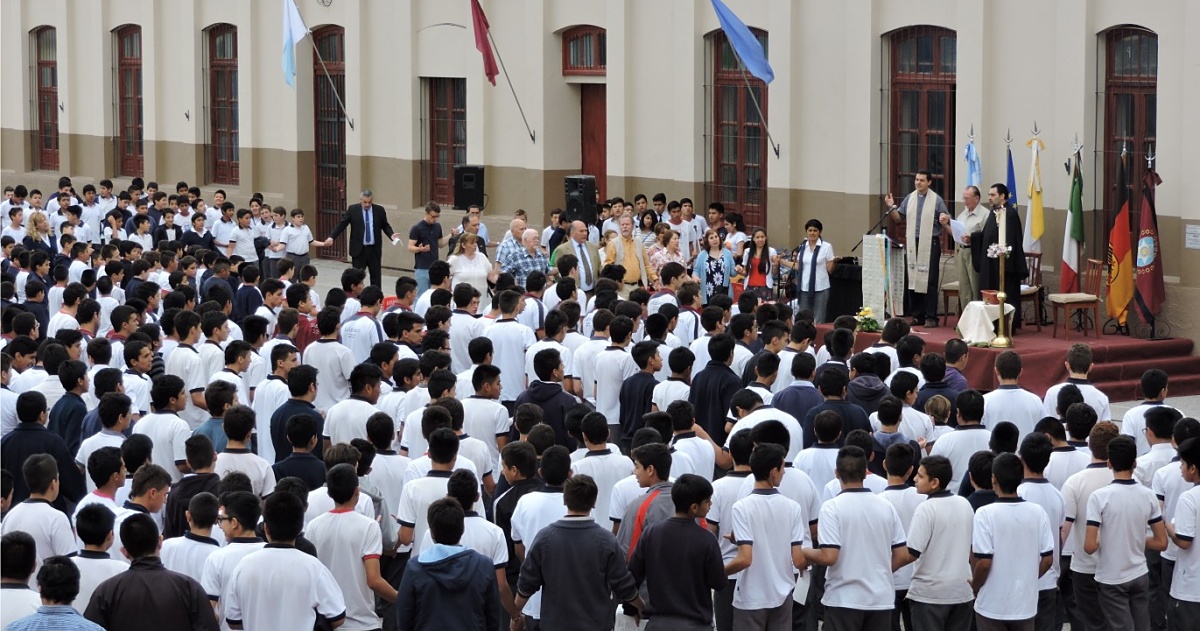 In order to put this plan into action, I contacted a religious order priest who shares my goal in trying to live the prayer of Jesus: “That all may be one”. Fr Adolfo, from the Orthodox Church of Antioch, also got involved, and together we organized every detail of the celebration. Subsequently the Lutheran Church asked to join us since our school community includes a young Lutheran volunteer from Germany. Others then showed interest in the event, such as the president of the local Syrian-Lebanese community, the German consul and the vice-consul of Italy, a representative from the Ministry of Education, newspaper journalists and the heads of other schools. The first step of Misael’s project was that of trying to build peace in our everyday relationships, and this gave rise to many new experiences lived among the children to which we also proposed the Time Out prayer for peace promoted by Youth for a United World. Through the homilies given by the celebrants, we shared in the life of Christians in Syria and Africa; the intentions for peace were read out by a young Orthodox girl while a woman recited the Lord’s Prayer in Arabic. The flags of the different countries which were hoisted up warmed our hearts and made us feel like members of the one human family. In short, it was a celebration that enabled each of one us to experience something that we had not experienced so strongly beforehand: profound friendships and unimaginable bonds. The school principle and staff of the school called it a historic day. “We thank God for our freedom,” concluded the young people present, “and we promise not to ever take sides but to stand on the side of peace.” Gustavo Clariá
In order to put this plan into action, I contacted a religious order priest who shares my goal in trying to live the prayer of Jesus: “That all may be one”. Fr Adolfo, from the Orthodox Church of Antioch, also got involved, and together we organized every detail of the celebration. Subsequently the Lutheran Church asked to join us since our school community includes a young Lutheran volunteer from Germany. Others then showed interest in the event, such as the president of the local Syrian-Lebanese community, the German consul and the vice-consul of Italy, a representative from the Ministry of Education, newspaper journalists and the heads of other schools. The first step of Misael’s project was that of trying to build peace in our everyday relationships, and this gave rise to many new experiences lived among the children to which we also proposed the Time Out prayer for peace promoted by Youth for a United World. Through the homilies given by the celebrants, we shared in the life of Christians in Syria and Africa; the intentions for peace were read out by a young Orthodox girl while a woman recited the Lord’s Prayer in Arabic. The flags of the different countries which were hoisted up warmed our hearts and made us feel like members of the one human family. In short, it was a celebration that enabled each of one us to experience something that we had not experienced so strongly beforehand: profound friendships and unimaginable bonds. The school principle and staff of the school called it a historic day. “We thank God for our freedom,” concluded the young people present, “and we promise not to ever take sides but to stand on the side of peace.” Gustavo Clariá
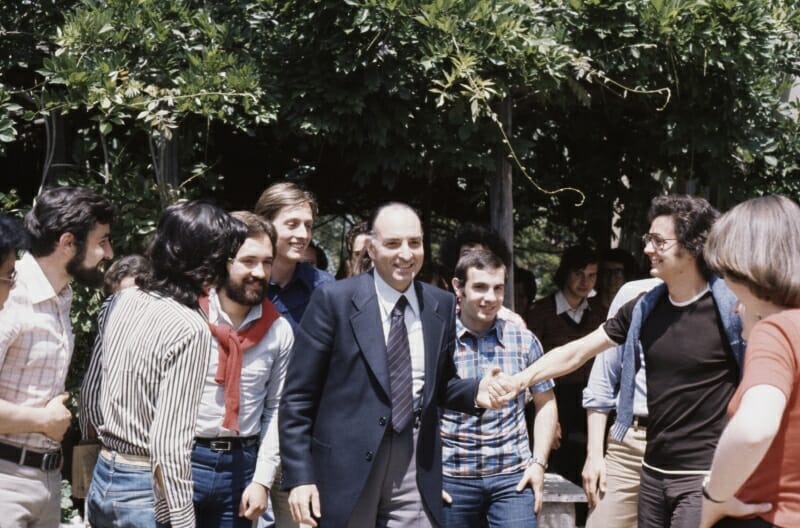
Jan 24, 2016 | Non categorizzato
 “Among Christians there is an experience that is similar to married life. Inevitably difficulties between the couple arise. Only if there is love these difficulties serve to maintain love and enable unity to grow among them. When love is absent, problems become an insurmountable obstacle and they are given as an excuse in the event of a separation. But in reality it is not the problems that have destroyed the family, but the lack of love. So it is between the Churches. The division happened not only because of religious or theological differences, but also – and at times foremost – because of political, economic or cultural motives. In the measure that love grows, disunity becomes unbearable and problems are overcome. I think that one day the various Churches, without abandoning their own traditions and legitimate expressions that have developed throughout history, can participate together, when God wills, in a Council that will unite them and which will ensure that the Church, while being one, retains many of these expressions. The time is perhaps premature, but in a single day God can make us live a thousand years. It will be an event which will have a profound impact on all members of the great religions.” From “COLLOQUI” – Pasquale Foresi – Città Nuova 2009 – pp. 155-156-161
“Among Christians there is an experience that is similar to married life. Inevitably difficulties between the couple arise. Only if there is love these difficulties serve to maintain love and enable unity to grow among them. When love is absent, problems become an insurmountable obstacle and they are given as an excuse in the event of a separation. But in reality it is not the problems that have destroyed the family, but the lack of love. So it is between the Churches. The division happened not only because of religious or theological differences, but also – and at times foremost – because of political, economic or cultural motives. In the measure that love grows, disunity becomes unbearable and problems are overcome. I think that one day the various Churches, without abandoning their own traditions and legitimate expressions that have developed throughout history, can participate together, when God wills, in a Council that will unite them and which will ensure that the Church, while being one, retains many of these expressions. The time is perhaps premature, but in a single day God can make us live a thousand years. It will be an event which will have a profound impact on all members of the great religions.” From “COLLOQUI” – Pasquale Foresi – Città Nuova 2009 – pp. 155-156-161
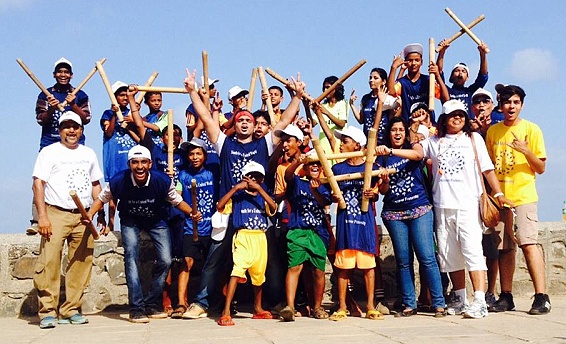
Jan 23, 2016 | Focolare Worldwide
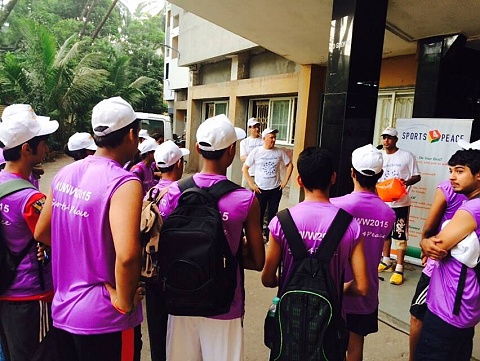 “Sport can really change the world and make it more united”. Patsy Furtado, a hockey coach from Mumbai who once played for the Indian national hockey team, speaks with the strong conviction that comes from an equally strong experience lived with street children in this immense metropolis. She had met the Focolare and the idea of Sportmeet through a Run4unity event in 2005. Her passion for sports and the experience of unity lived that day fuelled her desire to join forces with other like-minded coaches and bring about change in the surrounding area, where children often can be seen living on the streets. She had just got to know a home for destitute children with 240 children, neglected by society. She got the idea to start coaching them in different sports: football, basketball, hockey, athletics … Every morning at 6.30am they started having a one hour training session. Initially there were 20 girls and 30 boys who came for training without shoes and proper sports gear. Today there are a number of teams, all having proper sport shoes, gear and kit bag. In 2007 they entered the inter-school competition at the all Mumbai level and the under-12 football team stood eighth in Mumbai among over 300 schools. This achievement made it to the Hindustan Times, one of Mumbai’s major newspapers, with the heading “United We Stand”. Listing the numerous achievements of this project, Patsy points to the fact that the children’s behaviour improved tremendously: sports taught them to be disciplined and after playing sports all their energy is used in the right way. Whereas it would be natural to be violent and aggressive with a background like theirs, they become confident and have self respect, they look after their hygiene and take responsibilities. Coming from various religions the children come together to play as a team and there are no differences among them.
“Sport can really change the world and make it more united”. Patsy Furtado, a hockey coach from Mumbai who once played for the Indian national hockey team, speaks with the strong conviction that comes from an equally strong experience lived with street children in this immense metropolis. She had met the Focolare and the idea of Sportmeet through a Run4unity event in 2005. Her passion for sports and the experience of unity lived that day fuelled her desire to join forces with other like-minded coaches and bring about change in the surrounding area, where children often can be seen living on the streets. She had just got to know a home for destitute children with 240 children, neglected by society. She got the idea to start coaching them in different sports: football, basketball, hockey, athletics … Every morning at 6.30am they started having a one hour training session. Initially there were 20 girls and 30 boys who came for training without shoes and proper sports gear. Today there are a number of teams, all having proper sport shoes, gear and kit bag. In 2007 they entered the inter-school competition at the all Mumbai level and the under-12 football team stood eighth in Mumbai among over 300 schools. This achievement made it to the Hindustan Times, one of Mumbai’s major newspapers, with the heading “United We Stand”. Listing the numerous achievements of this project, Patsy points to the fact that the children’s behaviour improved tremendously: sports taught them to be disciplined and after playing sports all their energy is used in the right way. Whereas it would be natural to be violent and aggressive with a background like theirs, they become confident and have self respect, they look after their hygiene and take responsibilities. Coming from various religions the children come together to play as a team and there are no differences among them.  In 2009 the first Sports4Peace workshop was held in Mumbai. Promoting a cube with 6 rules to educate for Peace through sports, the idea of Sports4Peace captured the imagination of various coaches and others engaged in the field of sports in Mumbai and other cities in India. “Play well”, “Hang in there”, “Look out for others”: simple rules which have touched the lives and inspired several youth and sport enthusiasts to apply them with passion in their various disciplines. The idea of Sports4Peace became part of various interreligious cultural college activities as well as diocesan events in Mumbai and in Pune, a neighbouring city known for its numerous colleges. Presented in various Run4Unity editions also in Delhi, it was promoted in the recent United World Week hosted in Mumbai in May 2015, when a permanent Sports4Peace cube was installed in a prominent place in a public garden on Mumbai’s popular Bandstand promenade to remind all that sports, lived and played well, can promote peace and universal brotherhood. Gustavo Clariá
In 2009 the first Sports4Peace workshop was held in Mumbai. Promoting a cube with 6 rules to educate for Peace through sports, the idea of Sports4Peace captured the imagination of various coaches and others engaged in the field of sports in Mumbai and other cities in India. “Play well”, “Hang in there”, “Look out for others”: simple rules which have touched the lives and inspired several youth and sport enthusiasts to apply them with passion in their various disciplines. The idea of Sports4Peace became part of various interreligious cultural college activities as well as diocesan events in Mumbai and in Pune, a neighbouring city known for its numerous colleges. Presented in various Run4Unity editions also in Delhi, it was promoted in the recent United World Week hosted in Mumbai in May 2015, when a permanent Sports4Peace cube was installed in a prominent place in a public garden on Mumbai’s popular Bandstand promenade to remind all that sports, lived and played well, can promote peace and universal brotherhood. Gustavo Clariá

 Asti, the Piedmont (Italy) municipality renowned worldwide for its wines and an old pre-Roman settlement, boasts another first: that of being the first Italian municipality to have inserted the principle of Fraternity in its Municipal Statutes, as one of the main inspiring principles. «The Municipality of Asti considers the value of Fraternity as the condition for its political actions, in the common awareness that diversity is enrichment and to which every person elected in this institution is subjected to, and who should thus be recognised with equal dignity and respect and is therefore called to place the good of the community before partial interests, whether personal, of the group or the political party.» This is the text that passed with a unanimous vote on 19 February 2015, and won for the Municipality, the prize awarded in Rome by Mayor Fabrizio Brignolo last 22 January. How is this inspiring principle concretely practiced by the citizens? At the awarding of the prize, the Mayor of Asti recalled how the Asti community is very active in projects that express the value of fraternity in a concrete way: in the issue of welcoming the refugees with individual projects, a system of social services that targets to involve the beneficiaries in projects of recovery of independence in the employment and social fields, to name a few. So is the Municipality’s political life very simple? Not at all. A municipal councillor said: «The truth is, despite the fact that our ideals and political and cultural differences will not be eliminated, it also holds that moments of tension and conflicts will not be missing in our political –administrative debate. But it is likewise true that, from today onwards, we have a reference point and an extra precious tool that pushes us to seek the grounds for sharing, and in which we can exercise a serene approach to the building of fraternity. It is certainly a difficult challenge which we intend to win with courage and confidence. » The prize of the association, Cities for Fraternity, was awarded last 22 January by the president, Milvia Monachesi, Mayor of Castelgandolfo, together with Alba Sgariglia and João Manuel Motta of the Chiara Lubich Centre of the Focolare Movement, during the convention entitled, “Can Fraternity become a norm?” emceed by the journalist, Gianni Bianco, in the capital’s Hall, Pio Sodalizio dei Piceni (watch the live shoot ). Of great significance were the speeches of Prof. Filippo Pizzolato (Bicocca University, Milan) and Tiziano Vecchiato (Scientific Director of the Zancan Foundation, Padova), and the round table of the experiences and conflicts of the Municipalities that have inserted the principle of fraternity in their statutes: Asti, Bra, Grottaferrata and Rocca di Papa. Other honours were conferred to three other Municipalities: • Special Honours for the City of Rocca di Papa, which had launched the project of United Cities for Fraternity: «From darkness to light: “Wednesdays in the village”» with the mission to “enlighten the outstanding features and reunite hearts and minds” of the inhabitants – both Italians and of other nationalities – of Rocca di Papa. • Special Honours for the Municipality of Tolentino for the project, “Tolentino – city for fraternity” and the organisation of the “Fraternity Dinner,” a traditional event with the cooperation of the voluntary associations and citizens, where the funds collected were assigned to the poor people in the municipality. • Special Honours for the Municipality of Grottaferrata for the insertion of the value of Fraternity in the Municipal Statutes, as the condition for political action, unanimously approved by the Municipal Council on 27 April 2015. https://www.youtube.com/watch?v=cEtFoAdo6IE https://www.youtube.com/watch?v=P9bfpKF30Wk
Asti, the Piedmont (Italy) municipality renowned worldwide for its wines and an old pre-Roman settlement, boasts another first: that of being the first Italian municipality to have inserted the principle of Fraternity in its Municipal Statutes, as one of the main inspiring principles. «The Municipality of Asti considers the value of Fraternity as the condition for its political actions, in the common awareness that diversity is enrichment and to which every person elected in this institution is subjected to, and who should thus be recognised with equal dignity and respect and is therefore called to place the good of the community before partial interests, whether personal, of the group or the political party.» This is the text that passed with a unanimous vote on 19 February 2015, and won for the Municipality, the prize awarded in Rome by Mayor Fabrizio Brignolo last 22 January. How is this inspiring principle concretely practiced by the citizens? At the awarding of the prize, the Mayor of Asti recalled how the Asti community is very active in projects that express the value of fraternity in a concrete way: in the issue of welcoming the refugees with individual projects, a system of social services that targets to involve the beneficiaries in projects of recovery of independence in the employment and social fields, to name a few. So is the Municipality’s political life very simple? Not at all. A municipal councillor said: «The truth is, despite the fact that our ideals and political and cultural differences will not be eliminated, it also holds that moments of tension and conflicts will not be missing in our political –administrative debate. But it is likewise true that, from today onwards, we have a reference point and an extra precious tool that pushes us to seek the grounds for sharing, and in which we can exercise a serene approach to the building of fraternity. It is certainly a difficult challenge which we intend to win with courage and confidence. » The prize of the association, Cities for Fraternity, was awarded last 22 January by the president, Milvia Monachesi, Mayor of Castelgandolfo, together with Alba Sgariglia and João Manuel Motta of the Chiara Lubich Centre of the Focolare Movement, during the convention entitled, “Can Fraternity become a norm?” emceed by the journalist, Gianni Bianco, in the capital’s Hall, Pio Sodalizio dei Piceni (watch the live shoot ). Of great significance were the speeches of Prof. Filippo Pizzolato (Bicocca University, Milan) and Tiziano Vecchiato (Scientific Director of the Zancan Foundation, Padova), and the round table of the experiences and conflicts of the Municipalities that have inserted the principle of fraternity in their statutes: Asti, Bra, Grottaferrata and Rocca di Papa. Other honours were conferred to three other Municipalities: • Special Honours for the City of Rocca di Papa, which had launched the project of United Cities for Fraternity: «From darkness to light: “Wednesdays in the village”» with the mission to “enlighten the outstanding features and reunite hearts and minds” of the inhabitants – both Italians and of other nationalities – of Rocca di Papa. • Special Honours for the Municipality of Tolentino for the project, “Tolentino – city for fraternity” and the organisation of the “Fraternity Dinner,” a traditional event with the cooperation of the voluntary associations and citizens, where the funds collected were assigned to the poor people in the municipality. • Special Honours for the Municipality of Grottaferrata for the insertion of the value of Fraternity in the Municipal Statutes, as the condition for political action, unanimously approved by the Municipal Council on 27 April 2015. https://www.youtube.com/watch?v=cEtFoAdo6IE https://www.youtube.com/watch?v=P9bfpKF30Wk





 It all began in 2002, when the local community of the
It all began in 2002, when the local community of the 

 “I teach in a Catholic school in my city, Salta, in northern
“I teach in a Catholic school in my city, Salta, in northern 


